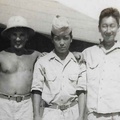I must have passed her house a thousand times. Each time, I wanted to stop, to see if she would hear my story and accept my gratitude. Would she even remember? I don’t know why, but on this one afternoon I stopped, got out of my car, and walked to her front door.
I will always remember her from that lazy autumn day from more than four decades ago. I was a ten-year-old boy playing touch football with some boys at the park. As the game wore on, the “touch” turned into “push,” then the “push” turned into aggressive horseplay. The next thing I knew I was in a huge dog pile. What started as fun turned into angry shouts. As I struggled in the dog pile, I heard the boy at the bottom snap, “Get off me, you stupid Jap.”
I had heard that word many times before and felt its sting each time. I looked around quickly and realized I was the only Japanese American playing. I jumped up, knowing that a war of words was about to begin.
“Hey, you can’t call him that!” shouted David, my usually jovial Jewish neighbor. I had never seen him so upset. “C’mon, Mitch, let’s go tell Eddie’s mom!” David sputtered as he angrily started marching me to Eddie’s house.
Tell his mom? What good would that do? She probably taught him the word! Parents of other kids had used that word around me without a second thought. The last thing I wanted to do was to hear the same racist slur from Eddie’s mother!
David persisted, and we somehow got to Eddie’s front door before I could fully collect my thoughts. David banged on the door. A middleaged woman came to the screen door. She had a kind smile. She looked friendly enough, but then I remembered what had just happened.
“Tell her what happened,” exclaimed David. “Tell her what Eddie did!” I couldn’t believe what David was asking me to do. Not only was I called a slur by a kid I didn’t know that well, but I had to plead my case before his mother! In the moment, I felt David was being more cruel than supportive!
Somehow I got my story out. Mrs. Klein stood there silent. I was sure she would support her son and admonish me for coming to her. She slowly opened the screen door. She looked me in the eye. Her smile had disappeared, and she said, “I am so sorry. I know how I would feel if someone called him a ‘Jew.’ I am so sorry he said that to you. I will speak to him.” With that, she gave me a big hug.
Talk about mind-blowing. It was the first time I could remember a non-Japanese American feeling as passionately as I did about how wrong racist taunts were. Her sincerity in the moment broke down years of defenses developed by playground arguments. To think that a hakujin would be as incensed about the word “Jap” as I was. She had just rocked my world. As we walked away from her house, my friend David beamed and said, “See, told you Eddie was wrong.”
Now, forty years later, I was once again standing in front of her door. I suddenly felt like that ten-year-old boy again. What would I say? How would she react? Should I just forget the whole thing?
I rang the doorbell. A moment later, a woman appeared. She was, of course, a little older, but she had the same kind smile. “Mrs. Klein?” I asked. “Yes,” she replied with the warm voice I remembered from years past. I shared my story with her and told her how grateful I was.
As she had done years before, she opened the screen door. Once again, she gave me a big hug. As she did she said, “Thank you, you made my day.”
I may have made her day, but she had helped to shape my life. By showing a ten-year-old boy that empathy, compassion, and human kindness know no color, she made me a better man.
Thank you, Mrs. Klein.
Postscript: The names in this story have been modified to protect Eddie’s identity. He grew up to be a fine man, undoubtedly the result of having an extraordinary mother.
* This article was originally published in The Rafu Shimpo in December 2016.
© 2016 The Rafu Shimpo; Mitchell T. Maki




